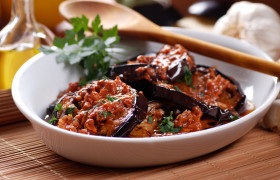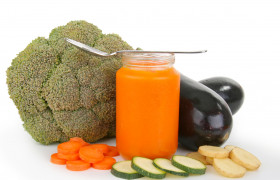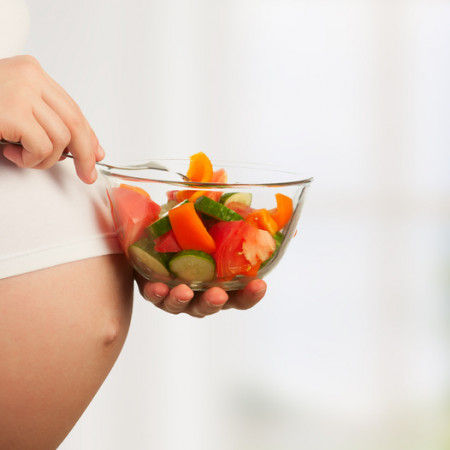
Eating well in pregnancy
My diet
Aim to eat twice as well, rather than twice as much, based on a balanced diet involving variety and nothing excessive.
Your baby will draw on your body throughout her accelerated 9 months of growing. Your intake must be enough to cover her needs in addition to yours, and to prepare your body for breastfeeding.

Eat a varied diet
In the 1st trimester of pregnancy, you should eat a varied diet to make sure that you are getting all the nutrients that are required for your child’s healthy development: protein, carbohydrates, fats, vitamins, and minerals.
In the next two trimesters, your appetite will progressively increase to meet your child’s needs.
Know that your body is adapting in order to use every nutrient you eat in the most effective way possible.
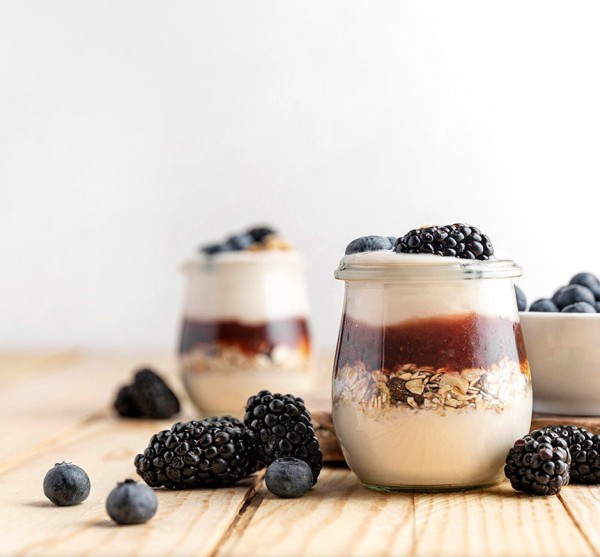
How much?
Outside of pregnancy, a woman’s recommended energy intake is on average between 1,800 and 2,400kcal/day, depending on her physical activity.
In the 1st trimester of your pregnancy, you will only need 150kcal more per day.
In the 2nd and 3rd trimesters, you will need to eat an additional 250kcal a day, for example as an extra snack.
This increase will both serve the foetus and changes in your body: storing fat, larger breasts, growing uterus, higher blood volume, amniotic fluid.
Snack ideas:
- bread (about 35 g) and 1 portion of cheese (about 30–40 g)
- 1 yoghurt or cottage cheese + 1 fruit
- 1 glass of milk, bread (about 50 g) with butter (10 g)
Don’t forget to drink water throughout the day.
During pregnancy, the quality of your intake is essential.
Make sure your diet is rich in certain nutrients such as iron, folates, iodine, calcium and vitamin D.
Folates or vitamin B9
These are essential for the formation of your baby’s nervous system. They can be found in fruits and vegetables—particularly in green vegetables such as spinach, broccoli, and lettuce.
Other interesting folate sources are walnuts, chestnuts, hazelnuts, and chickpeas. Supplementation may be considered if your diet is imbalanced, and always in line with your doctor’s advice.
Good to know: Frozen and canned fruits and vegetables have the same folate content as fresh vegetables. Eating at least 5 portions of fruit and vegetables a day is still advised.
Iron
A relatively common deficiency in women, this can become problematic for pregnant women. Expecting a baby increases your blood volume and oxygen requirements. Maintaining healthy iron levels and avoiding anaemia are more important than ever. It is worth noting that the body does not absorb non-haem iron (found in pulses, grains, and vegetables) as well as haem iron (found in meat and fish).
Good to know: To improve your iron absorption, eat food that is rich in vitamin C (citrus fruit, kiwis, berries, peppers; etc.) as part of the same meal. Additionally, avoid drinking tea with meals, as it lowers iron absorption.
Iodine
Pregnancy also requires more iodine. Seafood (fish and cooked shellfish) provides excellent sources of iodine, even when it has been frozen or canned. Eggs and dairy products from pasteurised milk are also reliable sources of iodine.
Good to know: To effectively top up your intake, use iodised salt for cooking and seasoning your food.
Calcium
We often hear that it makes for “solid bones.” Making sure that you have a good calcium intake is even more important during pregnancy. You will need enough of it to cover your own needs as well as your baby’s, since it goes into building the skeleton. Reach for cheeses, milk, and other dairy products, making sure they are made from pasteurised milk. These are the biggest sources of calcium. You can also boost your calcium intake by drinking certain mineral waters.
Good to know: To cover your needs, aim for 3 dairy products a day. Varying sources of calcium, such as milk, cottage cheese, yoghurt, and cheeses, is advised.
Vitamin D
Rarely is calcium mentioned without also talking about vitamin D. It plays a major role in binding calcium to bones, which is particularly important for your baby’s skeleton. A baby’s vitamin D stores are the same as her mother’s in late pregnancy.
Vitamin D is known as the sunshine vitamin: 2/3 of our reserves are produced through its action on our skin.
Good to know: Fatty foods are also good sources of vitamin D: salmon, tuna, sardines, anchovies, or mackerel. Some dairy products are also enriched in vitamin D. Ask your doctor for advice.
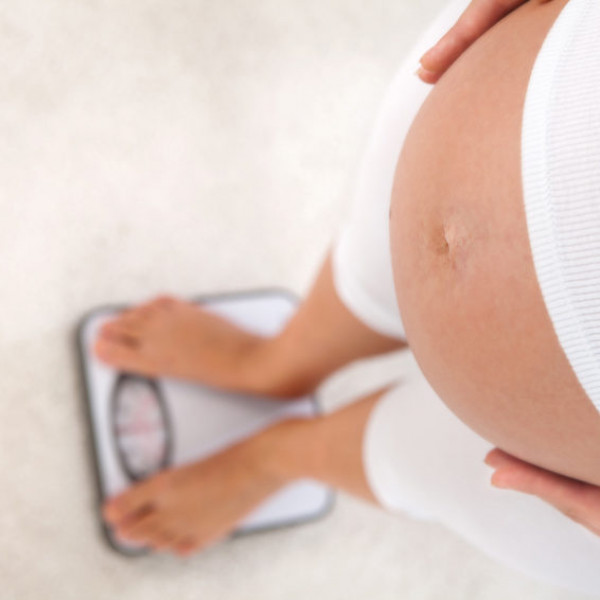
How can I control my weight?
Your doctor’s advice will help you adjust your intake based on what you burn.
It is not only normal, but important to gain weight in pregnancy. How much weight you gain will depend on your body type. As a rule, gaining 12 kg on average will make it easier to go back to your initial weight.
Expecting twins? Add 3 to 4 more kilos.
Non-linear weight gain.
In the first 3 months of pregnancy, you may not gain any weight at all. Women who suffer a lot from morning sickness may even lose a kilo or two in the first trimester.
After that, your weight gain will accelerate as your due date approaches.

What about cravings?
Cravings are normal: they tend to target specific and sometimes unexpected foods (strawberries or chocolate, for example).
75% of women will experience them at some point in their pregnancy. They can sometimes be a sign of the body needing certain nutrients. Cravings are more frequent after the second trimester and often involve acid foods.
Good to know: Contrary to popular belief, not indulging in your cravings will not have negative effects on your baby.
Managing your cravings
Watch you for overly fatty and/or sweet cravings. Swap them for a piece of fruit you really enjoy, for bread, or for a dairy product.
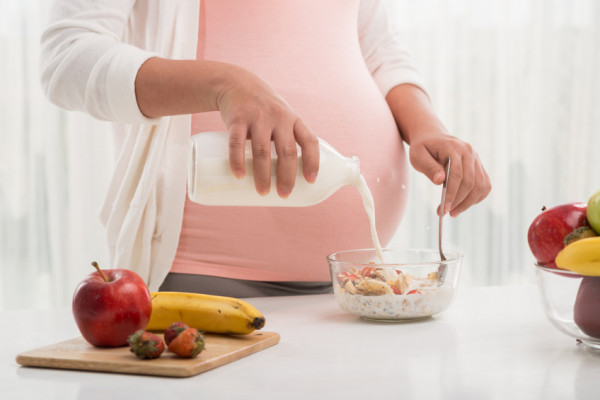
What if I’m still hungry?
Hunger pangs are frequent in early pregnancy. Do not eat twice as much, but do make changes to your diet. For example, you might have lighter meals and plan on adding a snack later, when you are hungry again.
Taking a few precautions:
Some foods should be minimised in pregnancy, and even entirely avoided.
Leave out:
- Dairy products from raw milk (raw-milk cheeses, unboiled milk, etc.), as they can harbour listeria. They carry a real risk of miscarriage if they have been contaminated.
- Raw seafood (such as oysters)
- Raw or insufficiently cooked meat (steak tartare, beef carpaccio, etc.), fish, or eggs, to eliminate the risk of toxoplasmosis, especially if you are not naturally immune to it.
- Soy-based foods and food supplements. Phytoestrogens (hormones) can have adverse effects on you and your child.
- Alcohol, even in small amounts, to avoid any risk of malformation, growth delays, and premature birth.
Reduce:
- Stimulants: tea, coffee, energising drinks and sodas that contain too much caffeine. Excessive consumption can accelerate your baby’s heart rate. Although it is not a cause for concern, it’s easy enough to avoid discomfort for your child.
- Salt: reduce your intake of salt and salty foods (crisps, cured meats, etc.), which tend to increase blood pressure. Lose the habit of systematically adding salt to what you are eating.
The right approach:
- Wash your hands thoroughly and often, especially before handling food that you are about to cook.
- Separate raw foods from cooked ones in the fridge, and wrap more fragile foods (meat, fish, ready meals) in the coldest part.
- Clean your fridge regularly using detergent, disinfecting it with bleach and water.
- Defrost food in the fridge, then eat it within 24 to 48 hrs.
- Don’t generate leftovers, to avoid contamination risks.
- Thoroughly cook fresh ingredients and food that you reheat to destroy any bacteria.
It’s important for you to be healthy and to stay healthy throughout your pregnancy. Come what may, the midwife or doctor who is monitoring your health will ensure that your pregnancy is going well and will answer your questions and concerns over the months. Don’t hesitate to seek their advice!
Our recipe ideas!
To support you throughout your pregnancy, France Lait Laboratory has selected delicious, balanced recipes.


